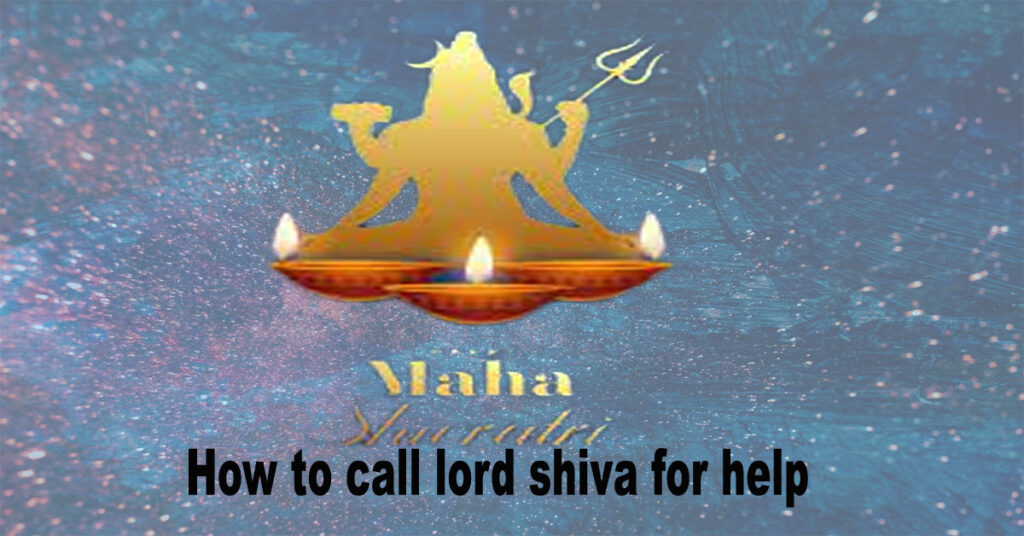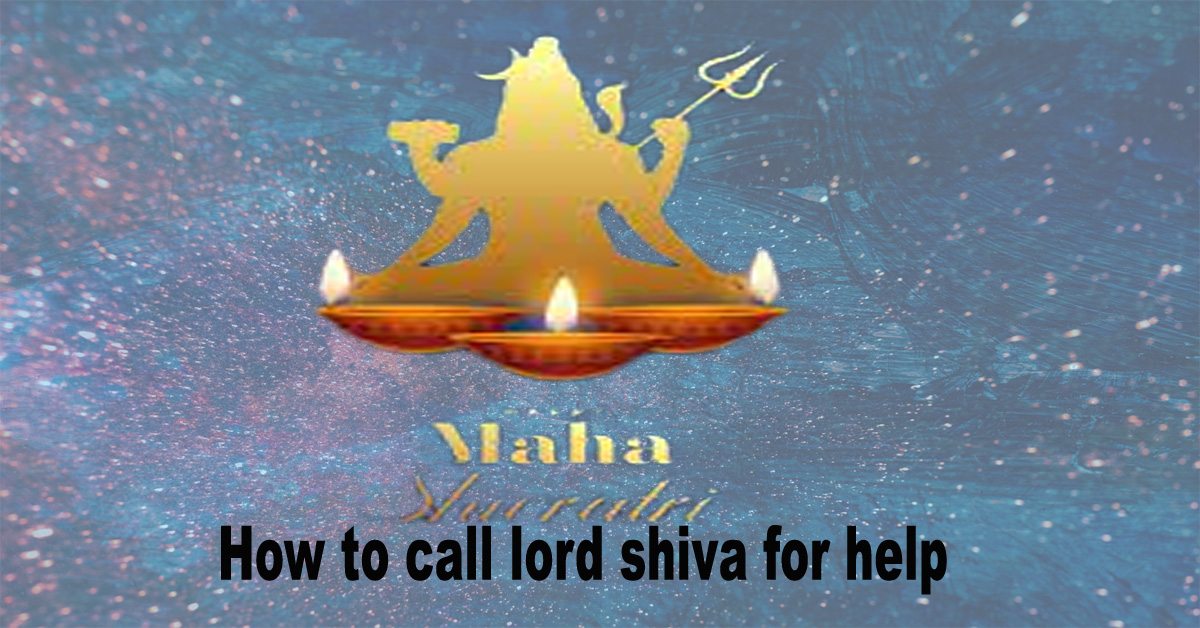How to call lord shiva for help
Lord Shiva is a revered deity in Hinduism and is often called upon for help, guidance, and blessings. Here are a few ways to call upon Lord Shiva for help:
- Chanting mantras: One of the most effective ways to call upon Lord Shiva for help is by chanting his mantras. The most popular mantra for Lord Shiva is “Om Namah Shivaya”. You can chant this mantra with devotion and sincerity to seek his help and guidance.
- Worship: You can offer prayers and perform puja to Lord Shiva by offering flowers, milk, and fruits. This is a traditional way of showing devotion and seeking his blessings.
- Meditation: You can meditate on Lord Shiva to connect with him on a deeper level. During your meditation, focus on Lord Shiva and visualize him in your mind’s eye. This will help you connect with his energy and seek his guidance.
- Seeking the help of a priest: If you’re not sure how to call upon Lord Shiva for help, you can seek the help of a priest or a spiritual guru. They can guide you on the proper rituals and mantras to use to call upon Lord Shiva for help.
Remember, the key to calling upon Lord Shiva for help is sincerity, devotion, and a pure heart. Seek his help with an open mind and a willingness to follow his guidance.

People ask for:
How do I ask Lord Shiva for help?
Lord Shiva is considered one of the most revered and powerful deities in Hinduism, and seeking his blessings and help is a common practice among his followers. Here are some ways you can ask Lord Shiva for help:
- Offer prayers: Start by offering your sincere prayers to Lord Shiva. You can chant his mantras or recite his names to connect with him. Some of the popular mantras include “Om Namah Shivaya” and “Maha Mrityunjaya Mantra.” You can also offer flowers, fruits, or other offerings to Lord Shiva.
- Meditate: Meditation is an effective way to connect with Lord Shiva. You can sit in a quiet place and focus your mind on his image or statue. Try to clear your mind of all distractions and focus on your intention to seek his help.
- Seek the guidance of a priest or guru: If you are unsure of how to approach Lord Shiva, seek the guidance of a priest or guru. They can guide you on the right rituals and prayers to perform to seek his blessings.
- Perform Shiv Puja: Perform Shiv Puja at home, which involves offering various items like milk, honey, water, and flowers to Lord Shiva, along with the chanting of mantras.
- Seek help through the Shiv Ling: The Shiv Ling is considered a powerful symbol of Lord Shiva. You can seek his help by meditating on the Shiv Ling or offering water and milk to it.
Remember to approach Lord Shiva with sincerity, humility, and devotion. Have faith in his power and trust that he will guide you in the right direction.
What is Lord Shiva Favourite number?
There is no specific mention of Lord Shiva having a favorite number in Hindu mythology or scriptures. However, the number “108” is considered significant in Hinduism and is often associated with Lord Shiva.
For example, in Hinduism, there are 108 beads on a mala (prayer beads) used for chanting mantras, and it is believed that there are 108 sacred sites throughout India associated with Lord Shiva. Additionally, some Hindu scriptures mention that there are 108 names of Lord Shiva.
Therefore, while there is no definitive answer to Lord Shiva’s favorite number, the number 108 holds great significance in Hinduism and is often associated with Lord Shiva.
Where is Lord Shiva alive?
Lord Shiva is a revered deity in the Hindu religion, and is believed to be omnipresent, meaning he exists everywhere and in everything. However, in Hindu mythology, Lord Shiva is often associated with certain places that are considered particularly sacred and significant to his worshipers.
One such place is the city of Varanasi, also known as Kashi or Benares, located in the northern Indian state of Uttar Pradesh. It is believed to be one of the oldest inhabited cities in the world, and is considered one of the holiest places in Hinduism. It is said that Lord Shiva himself resides in Kashi, and that a visit to the city and its sacred temples can bring great spiritual benefits to devotees.
Other places associated with Lord Shiva include the Amarnath Cave in the Himalayas, which is believed to be the site of Shiva’s revelation of the secret of immortality to his consort Parvati; the holy city of Rishikesh, located in the foothills of the Himalayas; and the ancient city of Ujjain in the state of Madhya Pradesh, which is home to the famous Mahakaleshwar Temple dedicated to Lord Shiva. However, it is important to note that Lord Shiva’s true dwelling place is believed to be within the hearts of his devotees, rather than any physical location
How do I call God?
The way people address or call upon God varies depending on their cultural and religious background. Here are some common ways that people address God:
- In Christianity, some common names for God are Father, Lord, Savior, and Redeemer.
- In Islam, the most common name for God is Allah.
- In Judaism, some common names for God are Yahweh, Elohim, and Adonai.
- In Hinduism, some common names for God are Brahman, Vishnu, Shiva, and Devi.
- In Buddhism, some people may address the divine as Buddha, although Buddhism does not typically have a deity that is equivalent to the Abrahamic God.
It’s important to keep in mind that the way people address or call upon God is a personal choice, and it may vary depending on the context and individual beliefs.
Which God will fulfill wishes fast?
I cannot provide a definitive answer to the question of which God will fulfill wishes fast. Different religions and belief systems have different concepts of God or deities and their attributes. Additionally, the fulfillment of wishes is a complex matter that may depend on a variety of factors, such as the nature of the wish, the sincerity and intensity of the person making the request, and the overall circumstances and timing of the request.
In general, it is important to approach spiritual or religious practices with respect, humility, and an attitude of gratitude, rather than with a focus on immediate gratification or selfish desires. Many belief systems emphasize the importance of cultivating virtues such as patience, perseverance, and compassion, which may ultimately lead to deeper and more meaningful forms of fulfillment than simply having one’s wishes granted quickly.
Which mantra makes Lord Shiva happy?
Lord Shiva is pleased with sincere devotion and a pure heart, and there are several mantras that are considered to be particularly auspicious for pleasing Him. One of the most popular mantras for Lord Shiva is the “Om Namah Shivaya” mantra, which means “I bow to Shiva.” This mantra is believed to invoke the energy of Lord Shiva and bring peace, happiness, and blessings to the devotee.
Another powerful mantra for Lord Shiva is the “Mahamrityunjaya Mantra,” which is also known as the “Great Death-conquering Mantra.” This mantra is believed to have the power to conquer death and grant longevity and immortality. The mantra is:
Om Tryambakam Yajamahe Sugandhim Pushti-vardhanam Urvarukamiva Bandhanan Mrityor Mukshiya Maamritat
There are many other mantras for Lord Shiva as well, such as the “Rudra Mantra” and the “Shiva Panchakshara Stotram.” Regardless of the mantra one chooses to recite, it is important to do so with sincerity, devotion, and a pure heart to please Lord Shiva.
What is the age of Shiv Ji?
In Hindu mythology, Lord Shiva is considered to be an eternal and timeless being, beyond the limitations of time and age. Therefore, he is not associated with a specific age or time of birth. Instead, Lord Shiva is seen as an embodiment of the cycle of creation, preservation, and destruction that exists in the universe. His existence is considered to be infinite and beyond the limits of time.
Is Shiva a human?
Shiva is a deity in Hinduism, and according to Hindu belief, he is not a human. Shiva is one of the major gods in the Hindu pantheon and is often referred to as the “Destroyer” or “Transformer” of the universe. He is usually depicted as a male with blue skin, multiple arms, a third eye on his forehead, and a crescent moon on his head.
In Hindu mythology, Shiva is one of the Trimurti, along with Brahma (the Creator) and Vishnu (the Preserver). He is considered the supreme god by many Shaivites, one of the main sects within Hinduism that worship Shiva as the ultimate reality.
Therefore, while Shiva is depicted in human form, he is not considered to be a human but rather a divine being in Hinduism.
Which God is success?
In different cultures and religions, there are different deities associated with success, prosperity, and abundance. Here are some examples:
- In Hinduism, the goddess Lakshmi is associated with success, wealth, and prosperity. She is often depicted with gold coins and lotus flowers, symbolizing wealth and purity.
- In ancient Greek mythology, the goddess Nike (also known as Victoria in Roman mythology) was the personification of victory and success.
- In Norse mythology, the god Odin was associated with victory, wisdom, and magic. He was often depicted as a powerful warrior and a wise sage.
- In Egyptian mythology, the god Ptah was associated with craftsmanship, creativity, and success in business and trade.
It’s important to note that success can have different meanings and interpretations for different people, and the concept of success can vary depending on cultural, religious, and personal beliefs. Ultimately, success may be seen as the achievement of personal goals and fulfillment, rather than just material or external achievements.
Which mantra is very powerful?
There are many mantras that are considered powerful in different spiritual traditions. Here are a few examples:
- “Om” or “Aum” – This is a sacred sound that represents the universe and the ultimate reality. It is believed to have the power to purify the mind and bring peace and clarity.
- “Om Namah Shivaya” – This is a Hindu mantra that is dedicated to Lord Shiva, the destroyer of ignorance and the source of all creation. It is believed to bring inner peace and balance.
- “Om Mani Padme Hum” – This is a Buddhist mantra that is associated with the bodhisattva of compassion, Avalokiteshvara. It is believed to bring blessings, compassion, and wisdom.
- “Gayatri Mantra” – This is a Hindu mantra that is dedicated to the Sun God and is believed to awaken the inner consciousness and bring enlightenment.
It’s important to note that the power of a mantra lies not only in the words themselves but also in the intention and devotion with which they are recited. Ultimately, the most powerful mantra is the one that resonates with you personally and helps you to connect with your inner self and the divine.




